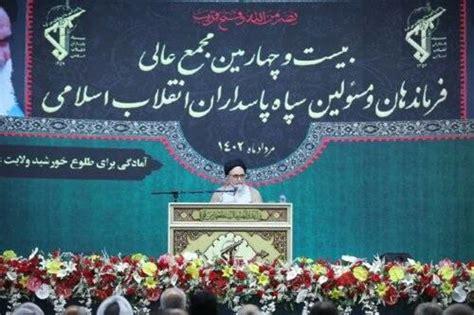
Iranian Minister of Intelligence Says His Country Holds ‘Spies’ from France, Sweden, UK
Iran’s Minister of Intelligence Esmail Khatib said that Iran is holding spies from Sweden, France, Britain, and several other countries and that some of them had been put to death.
Speaking at the 24th Supreme Assembly of Commanders of the IRGC, Khatib warned that “the enemy’s” aim is to destabilize Iran and reduce participation in the upcoming parliamentary elections in March.
Reiterating Khamenei’s statements, Khatib said that the enemies are trying to use the Baha’is, public frustration, trade union movements, and political currents that incite sedition and change, to provoke crises in society.
The intelligence chief said more than 50 foreign intelligence agencies have established an “Iran desk” to counter Iran.
The minister also blasted the US for creating the ISIS terrorist group.
Iran has foiled many plots after about 200 terrorists entered Iran and were looking to destabilize the country and the region during the 40th of Imam Hussain rituals in Iraq, the minister revealed.
Iran announced that ISIS claimed responsibility for an attack on a shrine in Iran’s city of Shiraz that killed two and wounded seven. Iranian officials said that they apprehended the logistics official for the group’s operations and the link between “ISIS Khorasan” and “ISIS in the Syrian territories”.
The officials, however, didn’t provide any evidence.
Khatib revealed that spies from Sweden, France, Britain, and several other countries, are in Iran’s captivity.
“Despite pressure from abroad, some of those spies were sentenced to death and executed,” said the minister.
He emphasized that coordination and collaboration among all parts of the intelligence community are key factors in Iran’s success in apprehending spies, said ISNA news agency.
Iran’s “Revolutionary Guards” have arrested dozens of dual nationals during the past two years, mostly on spying charges.
While rights activists accuse Iran of arresting dual nationals to use them as bargaining chips, some Western capitals describe their detained citizens as “state hostages”.
In January, Iran executed a former senior official over charges of espionage in favor of Britain.
Tension worsened between London and Tehran after the execution of dual Iranian-British national Ali Shamkhani, who once held a high-ranking position in the country’s defense ministry.
Iran does not recognize dual nationality for Iranians. This means that if dual nationals are detained, the government will not grant consular access to foreign officials to visit them in detention.
Earlier this year, Iran freed Belgian aid worker Olivier Vandecasteele, a Danish, and two Austrians in return for Iranian diplomat Asadollah Assadi who was serving a 20-year jail for his role in a bomb plot targeting a rally by opponents of the Iranian regime in 2018.
This month, Iran has moved five Iranian-Americans from prison to house arrest in exchange for billions of dollars frozen in South Korea. After the funds are transferred to the Swiss Central Bank account in Germany, they will be transferred to two bank accounts in Qatar.
The White House stressed last week that there would be restrictions on what Iran could do with any funds unfrozen under an emerging agreement.
Meanwhile, the adviser to the commander in chief of the “Revolutionary Guards”, Hossein Taeb said that protests and riots are decreasing as the elections approach, but the political confrontations are increasing.
In this context, he said that the enemies now plot to destabilize political stability instead of security stability, according to ISNA.
More than 500 protesters were killed in the violent crackdown on the protests in the wake of Mahsa Amini’s death. Over 20,000 people were arrested and seven were executed on charges of attacking the security forces.
Source » aawsat.com





